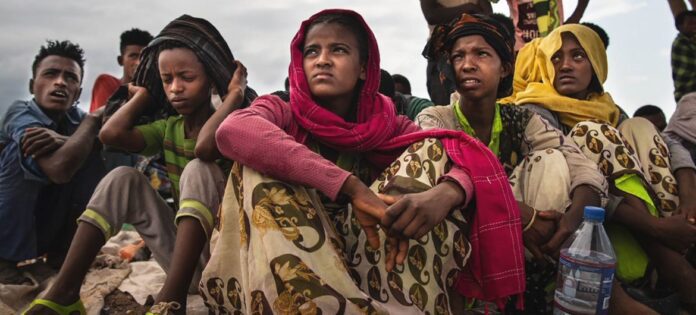Ugandan authorities have called for tighter border controls in response to increasing concerns after the country’s eastern and northern crossings were reported as key transit routes for human trafficking, particularly from Somalia to Libya.
Basalirwa Kigenyi Derrick, Deputy National Coordinator at the National Office for Countering Trafficking in Persons within the Ministry of Internal Affairs, highlighted these concerns during a press briefing at the Police Headquarters in Naguru.
He revealed that Somali nationals are being trafficked through Kenya and Uganda, with subsequent movement through South Sudan, Sudan, and ultimately, Libya.
“We have observed a significant number of trafficking incidents, especially through the Elegu One-Stop Border Post,” Basalirwa noted. “This route begins in Somalia, passes through Kenya into Uganda, and then continues northward.”
In response, Basalirwa urged authorities at all major border points, including Busia, Malaba, and Elegu, to heighten security measures and conduct comprehensive checks on travelers. He emphasized the need for vigilance, particularly when individuals of various nationalities appear to be passing through Uganda without a clear destination or purpose.
“Border officials must be more alert. It’s crucial to ask the right questions to determine the true intentions of these travelers,” he stated.
Basalirwa further explained that traffickers are increasingly enlisting the help of transporters, especially truck drivers, to move victims across borders. During inspections, several victims have been discovered hidden in vehicle compartments. Alarmingly, the same transporters involved in moving victims are often complicit in their recruitment and sheltering before handing them over to final handlers.
“We call on authorities at Busia and Malaba to take immediate and decisive action to address this growing issue,” Basalirwa said.
In addition to emphasizing the importance of bolstering border security, Basalirwa provided an update on the Trafficking in Persons mobile application, developed by the Directorate of Public Prosecutions (DPP) and launched in 2023. The app has proven to be a vital tool in tracking trafficking cases, with children representing the largest percentage of victims reported through the platform.
“We must continue to work together—parents, the community, and all relevant stakeholders—to protect our children and women from falling victim to trafficking,” Basalirwa stressed.
The update also revealed troubling trends regarding traffickers themselves. Men account for over 77% of those accused of trafficking, with the majority falling between the ages of 18 and 29, followed by those aged 30 to 49.
Basalirwa cautioned young people against becoming involved in trafficking activities, warning that many offenders have already faced imprisonment. He further emphasized that most victims are subjected to sexual exploitation, forced labor, and harmful child labor, underscoring the urgent need for continued vigilance and collective action to combat this pervasive threat.
These remarks come at a time when Uganda is intensifying efforts to address the alarming rise in cases of human trafficking, particularly those involving sexual exploitation and labor abuse.















